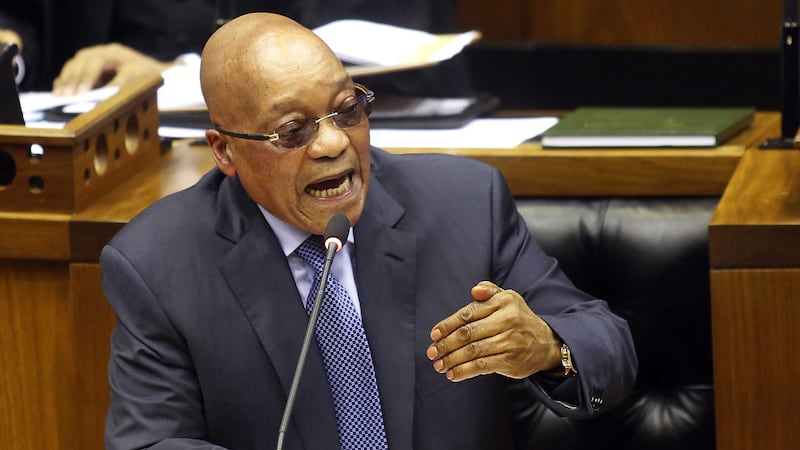SOUTH Africa is in danger of a significant social and political rupture. And unless the underlying factors are addressed, the fallout won’t be transient.
Rather it will be generational in scale and unpredictable in outcome.
Last week, revised IMF economic predictions put annual growth at just 0.6 per cent. The Rand currency fell 30 per cent in value last year. Unemployment is currently over 25 per cent. Ten per cent of South Africa’s 50 million population are now immigrants.
These are some of the same ingredients combusting today in Europe. Now, throw into that the poison of fractious political instability.
Just three weeks ago, the current president and ANC leader Jacob Zuma was found guilty by the constitutional court of “failing to uphold, defend and protect the constitution.”
For a country that promised fundamental renewal and a constitution promoted full-scale rebirth, South Africa now stands threatened by regression into a destructive generational cycle of sectarianism.
Much of the news focus falls on one man – President Jacob Zuma.
President Zuma has long been a controversial figure, embroiled in corruption allegations and dogged by his own unique dogma.
Following charges of raping a woman who was HIV positive a decade ago, President Zuma was found not guilty on the grounds that intercourse had been consensual. During the trial, however, he stated that he had taken a shower after the encounter to reduce the risk of contracting HIV.
For a country and continent ravaged by AIDS, Mr Zuma’s ignorance of basic sexual health facts was disturbing. And many women found (and find) his gender attitudes to reveal an ingrained misogyny.
His most recent serious transgression relates to £11 million upgrades on his private homestead at Nkandla. President Zuma claimed public money to pay for his chicken run, a new amphitheatre and a swimming pool on so-called “security” grounds. Following the constitutional court ruling, President Zuma apologised to the nation. However he has refused to resign.
One complicating factor is that he has effectively (perhaps reluctantly) been backed by the affable and capable deputy president Cyril Ramaphosa. This indicates that South Africa’s problem goes beyond one political office and affects the wider ANC leadership’s culture.
Mr Ramaphosa is no stranger to Ireland, having played a key role in monitoring the process of putting IRA weapons “beyond use”. He has rightly been praised for his skill and vision in the negotiations process leading to the democratic elections in South Africa in 1994 and the creation of the new constitution.
Having then stepped out of politics to become one of the richest business figures in Africa, Mr Ramaphosa has always kept a line into the ANC leadership. He would often have been seen as a unifier and ‘fixer’ of internal issues.
However, in recent years his deft touch has lapsed. Mr Ramaphosa once bid around £1 million on a prize bull but criticism caused him to apologise. And his share-holdings have seen him embroiled in the aftermath of the 2012 Marikana massacre which saw 34 striking miners shot dead by police. He subsequently became deputy president.
In recent weeks, senior ANC veterans like Denis Goldberg, Ben Turok, Cheryl Carolus, Trevor Manuel and George Bizos have all separately called for President Zuma to resign.
Nelson Mandela’s close friend, Ahmed Kathrada, wrote a heartfelt open letter pleading with President Zuma to stand down. Former minister for intelligence, Ronnie Kasrils, has strengthened the calls and worryingly warned of potential serious civil unrest on the horizon. Mr Kasrils voluntarily resigned his ministry in 2007 stating he “no longer (had) the stomach” for serving in such a political environment.
The implications of the ANC leadership’s cultural and ethical crisis aren’t just problematic for South Africa. They now represent a social and economic threat for the longer democratic development of the entire African continent.
By devaluing democratic values and practices in politics, society and the economy, the current ANC leadership culture has robbed Africa of vital signposts for progress. The problem isn’t what the ANC leadership represented historically, but what it has now become politically. The good example has become the rotten apple.
The ANC’s leadership is now caught between defending the internal agendas and institutional power of the party’s rulers versus delivering on the inherent public values which it has long espoused. The demise of hope in South Africa is a consequence of that group’s choices not the wider global context.
Until that reality is faced, President Zuma – like Napoleon the pig in Orwell’s Animal Farm - will remain sleeping in Farmer Jones’s bed and preaching hollow to South African society that everyone is still equal. (Of course, some are more equal than others.)








